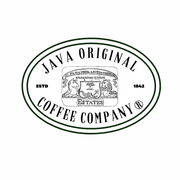About Us - Our History
Java Original® Coffee has a long history. In 1840, during the Dutch colonial era of Indonesia, Peter William Hofland purchased the Pamanoekan and Tjiasem Lands (also known as P & T Lands) near Subang (West Java) from Charles Forbes, the owner of Forbes & Co of Bombay (British India).*
The Pamanoekan and Tjiasem Lands one of the most extensive freehold properties in Indonesia, were given special autonomy rights to manage and establish its own independent government.
Hofland was born on September 2, 1802 in Jagannadhapuram (Daatijeroon) (Cocanada) Godavery, Madras (British India). Compelled by the British colonial government, he moved to Java, where, in 1833, he received a lucrative contract from the Dutch colonial government to cultivate sugar in Surabaya (East Java). Hofland was considered a charitable landowner who providing adequate wages to indigenous people who wanted to work on plantations (traditionally called 'coffee gardens') owned by Pamanoekan and Tjiasem Lands.
Being the owner of the freehold property, Hofland also greatly benefited the local residents by refusing to implement the forced cultivation system (known as cultuurstelsel, als known as tanam paksa or enforced planting), a revenue system that forced farmers to pay revenue to the treasury of the Dutch colonial government in the form of export crops or compulsory labor, introduced in 1830 by the new governor of the Dutch East Indies, Johannes van den Bosch, who was appointed by the Dutch Crown to increase the exploitation of the colony's resources.
However, the forced cultivation system was implemented only on land controlled directly by the colonial government, exempting the 'Vorstenlanden' (princely states) and the 'particuliere landerijen' (private domains or freehold properties).
Hofland, was a strong proponent of free-trade over forced labor and together with other owners of private domains and independent merchants and politicians in the Netherlands, he was instrumental in the introduced new laws promoting the change from a forced cultivation system to private enterprise. This led to the the abolition of the forced cultivation system in 1870.**
Hofland, who was a recipient of the Order of the Dutch Lion (Ridder in de Orde van de Nederlandse Leeuw), one of the oldest and highest Dutch civil orders established by King William I on September 29, 1815, died on February 5, 1872 in Subang (West Java).
Our unique history remains our driving force, creating a line of artisan roasted coffees while maintaining our family’s history & values. Today, while we cherish our unique history, we source our coffees from all over the world. With a our legacy, which includes Roastmasterz, we have something unique to offer, something, we believe, you want to enjoy and then to come back to for more...
To read more about our Unique History, follow the Link.
__
Note: * Today, Forbes & Co Ltd, the erstwhile Forbes Gokak Ltd, is an Indian engineering, shipping and logistics company based in Mumbai (Bombay). The company was established in 1767 by John Forbes of Aberdeenshire, Scotland, a descendant of an ancient family of Lord Forbes of Pitsligo.
** Goh, Taro (1998). Communal land tenure in nineteenth century Java : the formation of western images of the eastern village community; Department of Anthropology, Research School of Pacific and Asian Studies, Australian National University. ISBN 978-0-7315-3200-1 Retrieved 17 July 2020.
